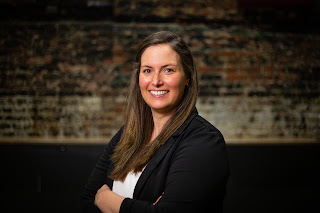Brooklyn Raney is the author of the book One Trusted Adult: How to Build Strong Connections & Healthy Boundaries with Young People. She also has created an organization called One Trusted Adult, which provides programs and professional development. A teacher and school administrator, she lives in New Hampshire.
Q: What inspired you to write One Trusted Adult?
A: As a school administrator I heard prevention program after prevention program, whether suicide, substance, or bullying, conclude their programs by stating that one of the greatest protective factors a young person can have in order to not just survive, but thrive, is having at least one trusted adult in the home, and one trusted adult outside of the home.
In my own experience growing up I could name many trusted adults - from hockey coaches to local lifeguards, school teachers to aunts and uncles. As I got older and worked in many youth-serving roles, I was devastated to realize that this was not the case for a large majority of youth.
I was inspired to write this book to help all adults see themselves in this role, provide skills for growing this type of connection, and help everyone understand the tremendous positive impact we can make by showing up in healthy ways for young people.
Q: You’ve also founded an organization with the same name—how did that come about, and how would you describe the connections between the book and the organization?
A: The book shares research, ideas, and inspiration for being a trusted adult for young people, and one of the biggest findings from that research is the need for real tools to implement to foster these trusted adult relationships.
One Trusted Adult, the company, is on a mission to ensure every child can name at least one trusted adult, and we pursue this mission by facilitating trainings for adults, educating young people on the benefits of reaching out to trusted adults, and providing curriculum for school advisory and mentorship groups that fosters connection and fun.
We also offer something called Operation: OTA, which provides schools with an assessment tool for measuring whether or not every student in their care can name a trusted adult, as well as provides action steps for follow up.
In short, the team at One Trusted Adult listens to the needs of educators and youth-serving professionals, and creates solutions to assist in building healthy relationships and communities - which will benefit all.
Q: One of the book’s themes is the concept of healthy boundaries. How would you advise an adult to build healthy boundaries with a teenager while also maintaining a strong connection?
A: Another strong finding from the research is the dependence of trust on boundaries. We define boundaries as a shared declaration of how we choose to live and work together. There can’t be trust without this!
I wrote the book as the long history of sexual abuse and cover-ups in youth-serving organizations was coming to light.
The strong response in schools and youth groups at this time was to train adults on a litany of forbidden practices, and while this is important, healthy relationships with young people are far more complex.
Establishing and maintaining healthy boundaries require our awareness of ourselves and others, a willingness to talk about boundaries, and our wellness. Boundaries are at the heart of child protections, as well as our greatest solution to adult burnout.
Our aim in our trainings and discussions on boundaries is to provide strategies that help good, committed, trusted adults stay in this important work for the long haul!
Q: What do you hope readers take away from the book?
A: Through my interviews for the book, I was able to categorize what I heard about the trusted adults who really made a positive difference, and what made them able to do so.
These characteristic categories are the ABC’s: Accessible, Boundaried, and Caring. It is in the overlap of these qualities where trust is built, and burnout is beat.
I hope that in reading the book, people will take away ideas and strategies for expressing accessibility, upholding boundaries, and showing care. And that whether in a young person’s life for a moment or a lifetime, they recognize the opportunity and make the most of it.
And I urge everyone to thank the trusted adults that showed up for them in their younger years - this is how we create a positive ripple effect and remind adults of their potential for positive influence.
Q: What are you working on now?
A: At One Trusted Adult we are working on an asynchronous e-course for educators and youth-serving professionals, monthly webinars for parents, and further development of Ripple Journals (middle school advisory program) and Branch Out (high school, student-led advisory program).
Another exciting project is on the 4C’s of mentorship modes. We are currently researching the many modes that a person in a leadership, mentorship, trusted adult, or parenting role must enter in order to best support a young person (or anyone!).
What we are discovering is that in any given moment someone might be in need of some cheerleading, challenging, comforting, or coaching. More to come on this!
And we are always gathering ideas for fostering connection and fun, and offer many of them through our newsletter - be sure to sign up! https://www.onetrustedadult.com/
Q: Anything else we should know?
A: We would love to hear from you! We are eager to feature stories of trusted adults showing up for youth from around the world - be in touch with us if you have a story to share or want to celebrate someone who showed up for you.
And, when in doubt, be who you need(ed) - be there for others in the way you need now and in the way you needed when you were their age.
--Interview with Deborah Kalb


No comments:
Post a Comment